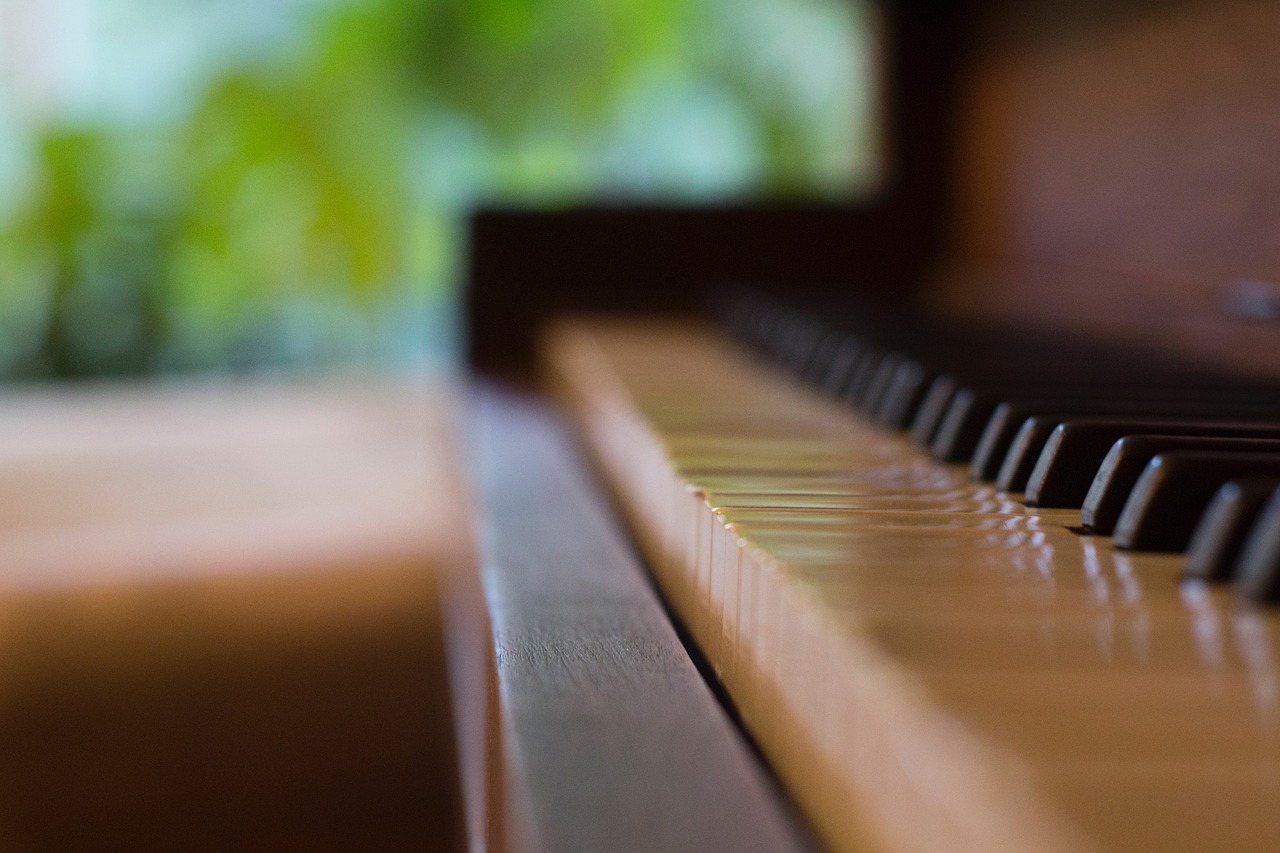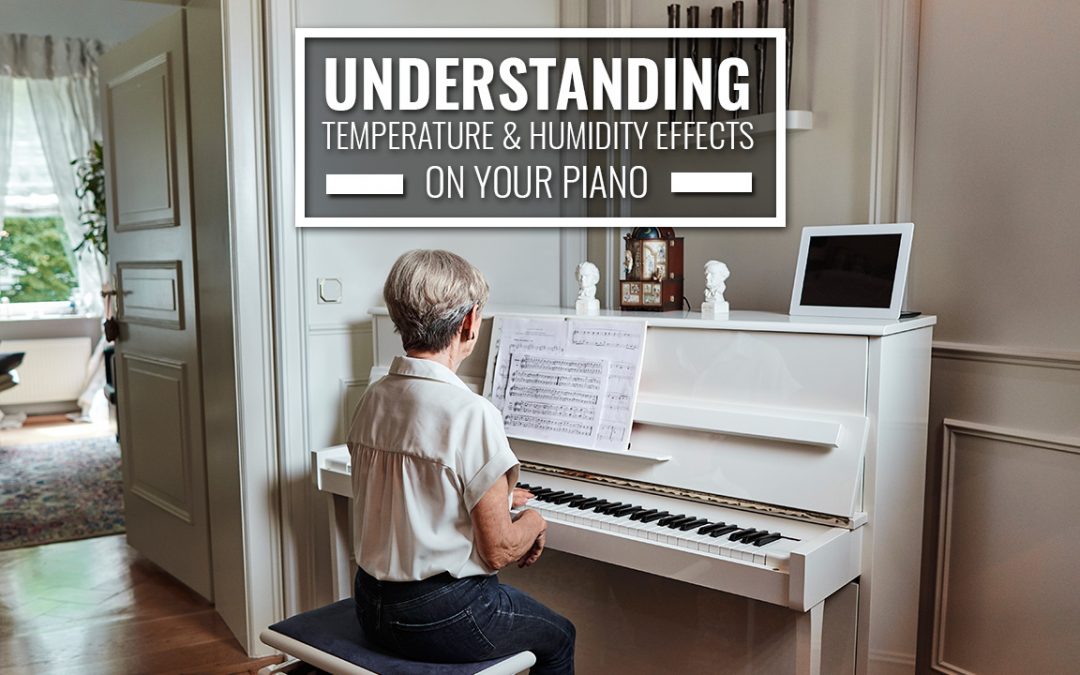Piano maintenance and care is one of the most important aspects of owning a piano!
There are many environmental factors that can influence your piano’s state, from minor effects to bigger, more costly damages. Most likely you have seen pianos in various homes that collect picture frames, knick-knacks, dust, and other such items that could scuff the outer polish of your piano. Some factors can affect the inside of your piano too, such as temperature and humidity.
Slight shifts in weather conditions and the fluctuation of the temperature of the room where your piano is stored can have a significant and negative impact on the overall “health” of your piano.
Depending on what area you live in and the climate that is typical for that region, there are certain precautionary measures that you can take in order to prevent any damage to your piano. Continue reading for helpful piano maintenance tips to proactively guard against the effects of temperature and humidity on your piano.
Temperature & Humidity Effects on Your Piano
Let’s first begin with the different ways in which climate and humidity can have lasting effects on your piano.
Pianos are primarily made of wood, and when the temperature deviates between hot and cold, wood is known to expand and contract with the ebb and flow of the thermometer. When it comes to your piano and temperature fluctuation like this, a change can potentially impact function.
Unfortunately, in very humid and warm regions, the piano soundboard (which is the main piece in the piano that the strings vibrate against) can expand and cause internal damage to your piano. This can have significant repercussions for your piano’s function, as it can influence the overall sound and tuning of the instrument.
Where is the Best Place to Keep Your Piano?
Thoughtful piano placement can help guard against temperature and humidity changes in your area. For optimal piano climate control, it is crucial to keep your piano in a room that:
- Avoids direct sunlight
- Has a thermostat to control the inside temperature
- Has fewer windows if it can be helped
- Doesn’t have a fireplace
If a piano is kept too close to a window, both warm and cold temperatures can affect your piano, even from the inside! Another good tip is to never keep a piano in a room that has a fireplace because when lit, it can draw moisture out of the air and be too warm for the instrument.
Helpful Piano Maintenance Tips
What is the best way to keep your piano maintenance in check and up-to-date? There are several piano maintenance tips that will help combat effects of temperature and humidity on your piano.
Regular Piano Tuning
First of all, it is important to do regular tuning for your piano, especially if it has been successfully moved around and seasoning your piano for a different climate becomes necessary. Recent moves and temperature fluctuations can be a catalyst for needing to get your piano tuned up, but regular tuning can also be a proactive way to prolong your piano’s life.
Piano Climate Control
When pianos are kept in storage, it is imperative that you keep them in a climate controlled facility to prevent any internal damage to the piano. We at West Coast Piano Moving & Storage understand the sensitivity of pianos to temperature and humidity, and our storage center is specifically designed to provide the optimal piano climate control.
Furthermore, if it is important to you to keep your piano stored in a climate controlled center when storing it, then you should apply that same strategy to how your piano is kept in your house day-to-day.
What’s the Best Piano Humidity Range?
The ideal humidity range to keep your piano at is typically around 45% humidity with the absolute maximum being 70%. This may seem like a large range, but it really depends on the overall climate of where the piano is kept.
Plan Your Piano Maintenance Schedule
A good maintenance schedule to follow for your piano care is the changing of the seasons!
For example, as the weather starts to cool down after it has been a warm summer can be the perfect opportunity to perform regular maintenance on your instrument.
Overall piano maintenance can be a lot of work if you want to keep your piano in great working condition. If you stay on top of having regular service to your instrument, you should be in good shape! Take the time and put effort into your piano so that you won’t be paying for it in the long run.

About West Coast Piano Moving & Storage
Our piano moving experts understand the importance of proactively caring for your piano against the negative effects of temperature and humidity.
In addition to moving your piano safely between locations, we also have a climate controlled storage facility where we offer options to host your piano for both long term and short term time periods.
Your piano is safe in our hands. Reach out for more information today!


Our A/C unit failed, and the temperature inside is 85-87 degrees with 70% humidity. The replacement is coming tomorrow, but what can we do in the meantime?
Hi Robert, apologies for the delay. If you’re still in need of advice, feel free to reach out to our team to discuss your piano care needs.
Can a piano be placed in a finished basement?
Hi Alyce! You’ll want to consider the consistency of temperature and humidity in your finished basement, as well as the actual logistics of moving the piano downstairs. For your specific situation, reach out to our team & we can talk through it!
Thanks for pointing out that when pianos are kept in storage, it is imperative that you keep them in a climate-controlled facility to prevent any internal damage to the piano. I am thinking about putting my piano in storage because I can’t fit it in my apartment right now. I will have to make sure to look into humidity-controlled storage to help keep it in good shape.